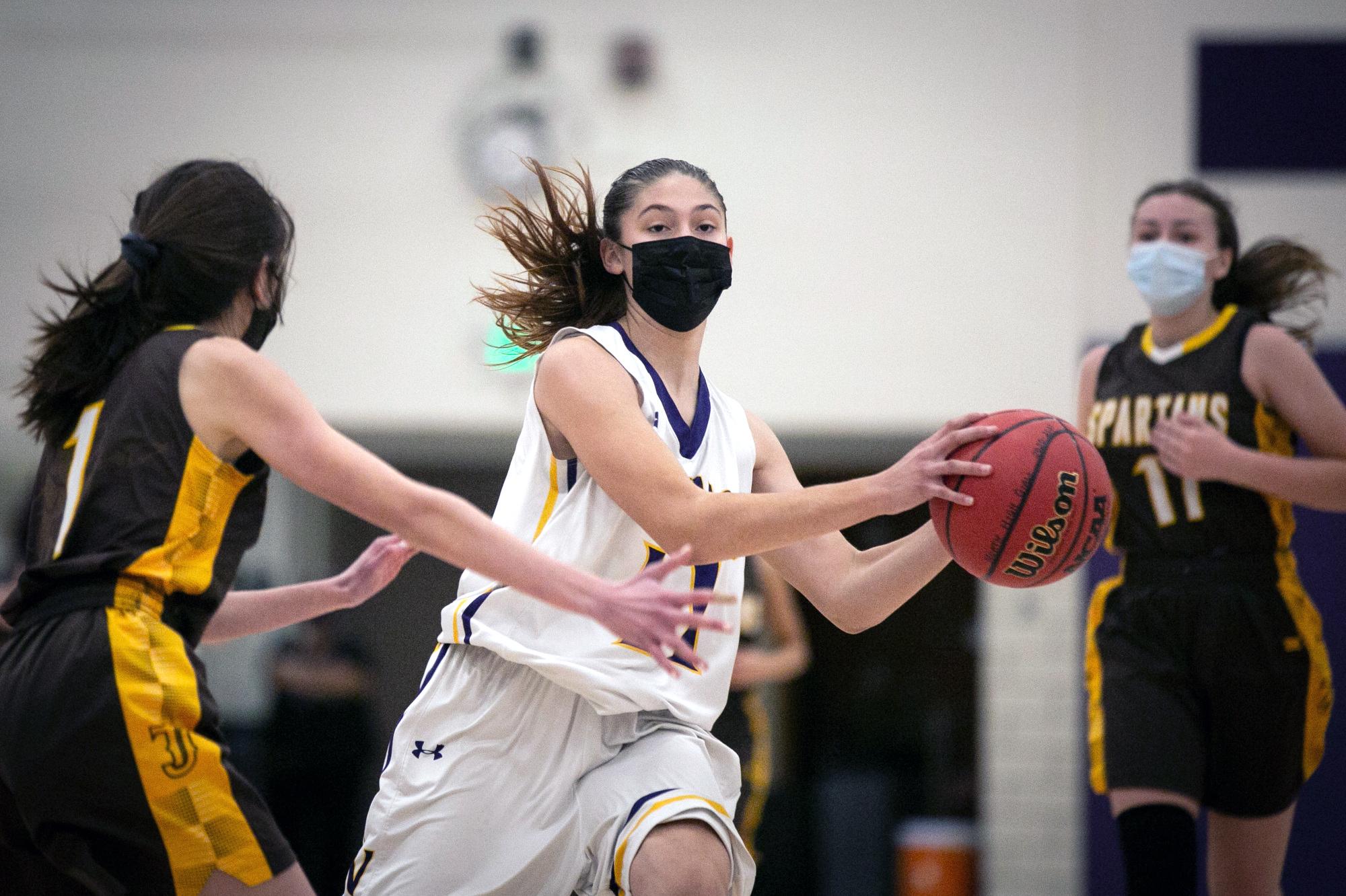
North High School senior Shee Yusuf sat at home for months just thinking about basketball.
He kept bugging his coaches. Would there be a season? Would there be a season? He finally got word that yes, winter high school sports was on.
“It’s thrilling to be back with my family,” he said, referring to his second family of teammates and coaches. “If there wasn’t a season, it would break me down.”
The coronavirus has taken a devastating toll on Yusuf’s family. He lost his grandmother and two aunts to the virus. His mother also got COVID-19. His father currently needs a kidney replacement and is medically vulnerable. So, the 17-year-old chose to live with his sister for the duration of the basketball season.
“It’s a decision I made to protect my mom and dad,” he said.
School districts across Colorado will try to strike the balance between running a winter sports season and keeping others safe — students and staff at school and parents at home. Just a couple of weeks into the winter season, a Cherry Creek wrestling team experienced “an extraordinarily high COVID-19 attack rate” while hundreds of other teams report that, so far, fingers crossed, everything’s going well, with no COVID-19 cases.
“Our desire was to get kids back in sports,” said Bert Borgmann, assistant commissioner with the Colorado High School Activities Association or CHSAA. “We've accomplished that. If we can keep them back in sports it's going to take everybody’s cooperation from officials, coaches, parents administrators and athletes.”
In December, the state granted a variance to CHSAA, allowing six winter sports and competitions to take place. Sports including ice hockey, wrestling, girls swimming, wrestling, skiing, basketball and competitive spirit began to compete on Jan. 25.
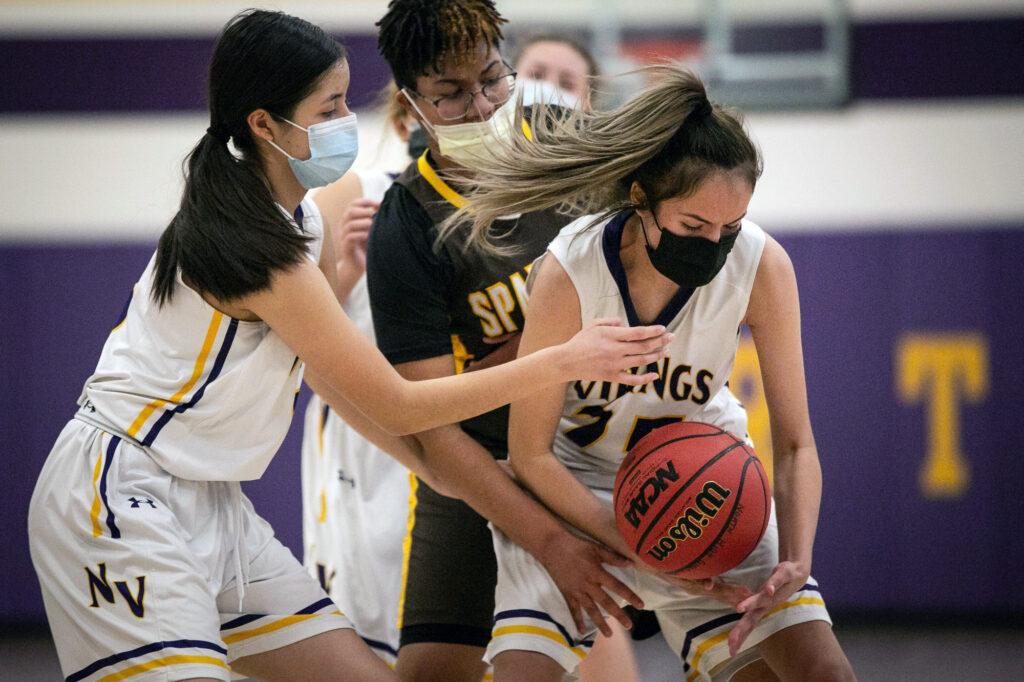
It was good news to tens of thousands of students who have struggled with social isolation and missing parts of the high school experience that give them meaning.
“I’m just thankful we’re able to start integrating back to a sense of normal life and doing so in a safe way,” said North High senior Marisa Diaz Bonacquisti, who has been on the varsity cheerleading team for four years.
The pandemic considerations are touching all sports. For example, Diaz Bonacquisti can no longer do certain stunts because she must wear a mask, according to Denver Public Schools regulations.
During a recent swim meet, North High, East High and Thomas Jefferson High, all raced in their own school pools. Race times are compared to name a winner.
“The adrenaline is a lot less,” said junior Kate Adams. “You swim a lot slower, personally, when you’re not against the competitors.”
No matter, she said. She’s just happy to be back with the team.
And there are other considerations, North High school parents weren’t cheering from the stands during the meet. They instead watched their daughters slice through the water at home through a Google Meet screen. No spectators were allowed. In North’s basketball gym, a sophisticated video camera tracks the basketball, providing parents a living room-couch view of basketball games. Under new rules, high school basketball players wear masks.
A number of North High School athletes interviewed by CPR News said the masks were challenging, but nothing they couldn’t handle.
“It’s a lot harder for sure,” said 17-year-old senior basketball player Jake Drummond. “It’s pretty annoying because you get the sweat accumulating in your mask, but I’m out here to play so that’s the least of my worries.”
There are more frequent breaks during the games. Varsity and junior varsity teams don’t scrimmage or practice together anymore and coaches stay separate.
Basketball quarantine cancellations have reached 35 games in the Denver Metro Area and about 20 others statewide.
"We knew we were going to lose games to COVID-19,” Borgmann said.
- Dentists Were Kinda Pandemic Ready Since They Stick Their Hands In Gross Mouths Every Day
- Colorado Dials Back Coronavirus Restrictions, Allowing Larger Crowds At Gyms And Restaurants
- Not A ‘COVID Winter,’ But A Winter Of Joy For Powderhounds Falling In Love With Backcountry Skiing
- ‘Something I Love’: This Teen Found New Appreciation For Swimming After Coronavirus Closed Pools
Some Sports Are Trickier To Police
While state health officials set the baseline rules — like masks must be worn by athletes with exceptions for swimming, wrestling, hockey and spirit activities — each district can make more restrictive regulations based on agreements with their local health department.
Wrestling, because of the close physical contact required, poses significant challenges, and districts have landed on different rules. The CDC just published a report about two high school wrestling tournaments in Florida in December that led to 80 people contracting the virus. One person died. Another January student wrestling tournament in Louisiana led to an outbreak.
Boulder County Health Department initially didn’t grant a variance for wrestling. Then it reconsidered. Students are required to wear masks at all times. Significantly, it also requires wrestlers to learn remotely: They will only be able to return to in-person 14-days after the wrestling season has ended.
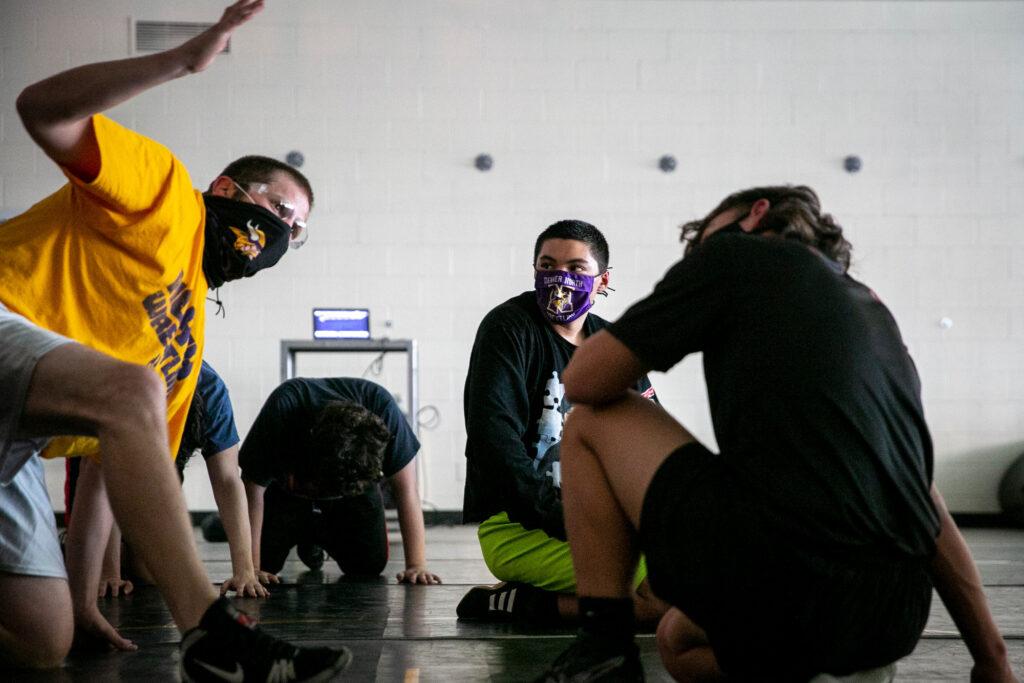
The Tri-County Health Department also recommended remote learning for wrestlers. In fact, in a Jan. 11 letter to state health officials and CHSSA, it recommended wrestling be delayed until later in the school semester when more vaccine has been distributed. It said it had “significant concerns” about the state guidance that exempts wrestlers from wearing masks.
State officials said they relied on guidance from the American Academy of Pediatrics that recommended against mask wearing during wrestling because “face coverings could pose a choking hazard.”
An outbreak at Eaglecrest High School, which falls under the jurisdiction of Tri-County Health and the Cherry Creek School District, led to 35 positive COVID-19 cases on the team. The wrestlers were not learning remotely. The district purchased masks and strongly encouraged their use but left it up to individual wrestlers to choose to wear one and follow state guidelines.
As of last week, there were seven positive cases on the wrestling team and two coaches testing positive, according to the district, with the state recording 35 total COVID-19 cases at the school.
A letter to the district from the Tri-County Health Department noted “an extraordinarily high COVID-19 attack rate of 63 percent” on the wrestling team.
That alarmed Eaglecrest High teacher Sandy Mikesell.
“We’ve had more cases at the high school level in the past four weeks than we have in the entire 11-week period this fall,” she said at a Monday school board meeting, noting that the wrestlers don’t wear masks. She wants better policies practiced by some other districts.
The Eaglecrest basketball team was also asked to quarantine after a positive COVID-19 test from a player. A swimmer on the girl’s swim team also tested positive but the team has not had to quarantine, the district confirmed.
Cherry Creek School District officials declined to comment for this story.
It’s hard to pinpoint, however, where the first student-athlete who tests positive contracts the virus, such as a student party.
“It turns out we don’t have a lot of control over them after they leave our school building,” noted Meeker School District Superintendent Chris Selle.
The rural school district had a recent outbreak — 17 positive cases — where half the cases were associated with extra-curricular activities.
“There were students on our boys’ basketball team, students in our drama department and students on our wrestling team that tested positive,” Selle said. School leaders quarantined about 70 students in total, including both sports teams.
Skip The Hassle Or Require Daily Testing?
Several school districts decided to bow out of the winter sports season entirely. Mapleton District postponed athletics and performing arts programs until students could more safely interact. The district is trying to keep learning cohorts separate and safe from one another. When they could safely return to playing, athletes from seven small high schools in the district typically practice and compete at one location, the Skyview Campus.
“If they’re one person coming into a cohort, they run the risk of infecting all the other students in a cohort but they also run the risk of infecting the adults in the cohort as well,” said Dave Sauer, the district’s chief operations officer.
Sauer, who was a school coach for 22 years, said it was a difficult decision to postpone sports but he believes it was the right one.
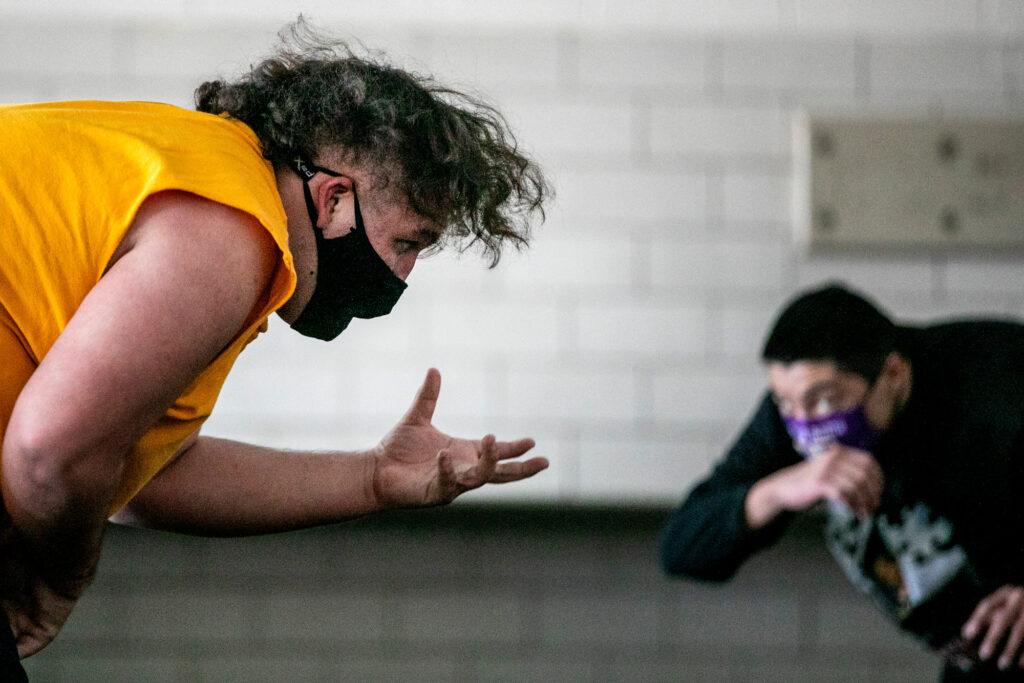
Aurora Public Schools requires mandatory testing every other week for all athletes practicing indoor sports.
Over the winter break, Aurora Public Schools Athletic Director Casey Powell and his team scrambled to get testing set up at the district’s five comprehensive high schools. Once a week, from 10:30 a.m. to 4:00 p.m., student-athletes get tested.
“It was important to give kids a healthy outlet that won’t endanger their team or their academic classes,” Powell said.
The service is free with the district’s COVIDCheck Colorado contract. But hiring folks to administer the test will cost the district $280,000 through the end of the year. Powell said it’s worth it. More than 1,000 tests so far found three positive cases and one inconclusive. Students were asymptomatic in all cases.
“We were able to quarantine them in a way that it did not stop practice, it did not stop our teams and those kids and are now going to the return to play protocol so they can get back with their teams and not miss much of the season, so it’s actually been huge.”
Both Powell and Superintendent Selle said sports give students a sense of normalcy.
There is better engagement in school when students participate in activities like sports, and well-documented additional benefits, like “How do you deal with adversity? How do you be a good teammate? How do you work hard for something you’re trying to attain? Those are all strong learning opportunities for our kids,” Selle said.
Youth Sport Have A Mental Health Benefit
Increased rates of anxiety and depression in young athletes was one of the motivating factors to get kids back into athletics, said Dr. Aaron Provance, medical director of pediatric sports medicine at Children’s Hospital Colorado and an advisor to CHSAA.
“We know that for a lot of these athletes, this is their identity … and when you take that away from them, it's like you’re taking their identity away, [it] affects their mood and anxiety levels and depression levels.”
In the North High gym, 16-year-old Jazmyne Cook is lacing up her basketball shoes, getting ready for practice. It was “super exciting” to return to her team, “because it feels like for a while I lost my social skills, I just wanted to be in bed all day, so now it makes me excited to get up in the morning so I have something to do,” Cook said.
Provance said it's critical for coaches and athletic directors to understand that parents and athletes have different comfort levels playing sports during COVID-19.
“There are social pressures that may come from other teammates and coaches to play,” Provance said. “But at the same time these athletes may have a family member at home that’s immune-compromised or an older family member and that makes this decision much more difficult for that athlete and for the parents to allow them to play.”
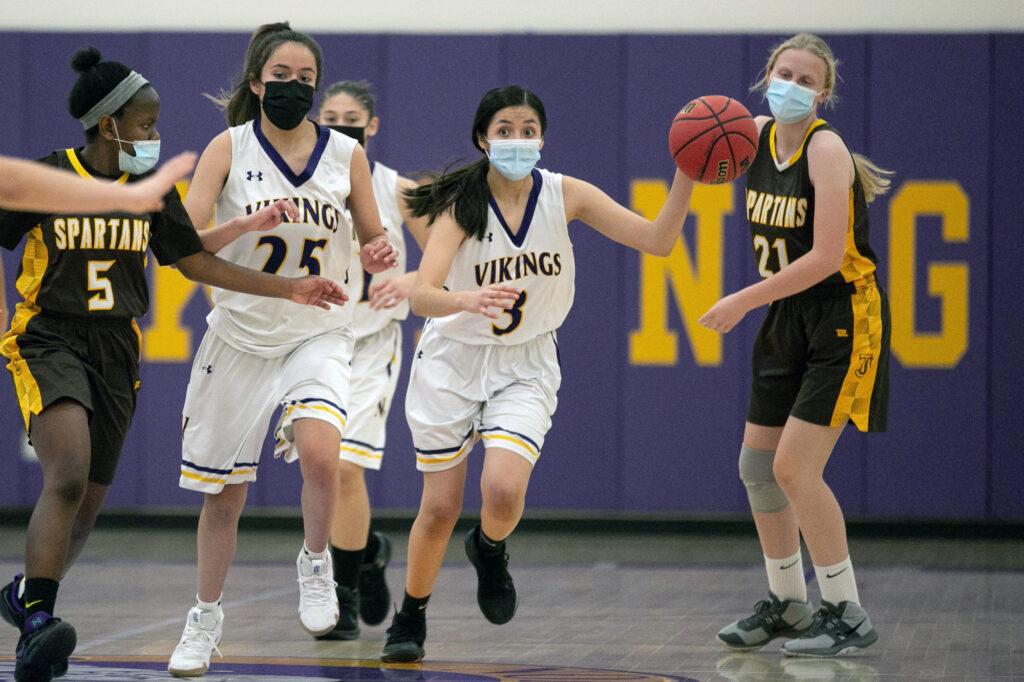
What are the health complications that can arise from a COVID-19 infection in a student-athlete?
Dr. Julie Wilson, a pediatric sports medicine specialist at Children’s Hospital Colorado, said schools are working extremely hard to keep a safe environment. She said younger athletes don’t seem to be getting as many severe cases of COVID-19 or hospitalizations as older student-athletes. But there’s still a risk of contracting the virus.
“That’s a risk that people need to be aware of when they’re letting their kids be in sports, is there’s a very real possibility they may catch this unfortunately in the sports setting,” Wilson said.
If a student gets infected, she and her colleague Dr. Provance recommend a full workup with a primary care physician. If symptoms last more than three days in an athlete, they said doctors may consider an EKG or a full cardiac evaluation.
When the athlete returns, coaches and trainers follow a return-to-play protocol where they watch for “exercise intolerance,” which could involve chest pains or shortness of breath with exercise.
“They could have palpitations or feeling like their heart is racing, they may have a near-fainting episode, those are strong indications that they may have myocarditis [inflammation of the heart muscle] and may need further workup,” Provance said.
North High School wrestler Levi Arguello said he’ll do everything he can to keep safe. The senior said he stays at home a lot and avoids crowds. Arguello is nothing short of ecstatic to be back wrestling.
“It’s an awesome sport,” he said on a break from the mat, rock music blaring in the background. “I just love how hard it pushes you. I just love every fact about it – the sweat, how tired you are, the challenging yourself, everything about it is just awesome.”








